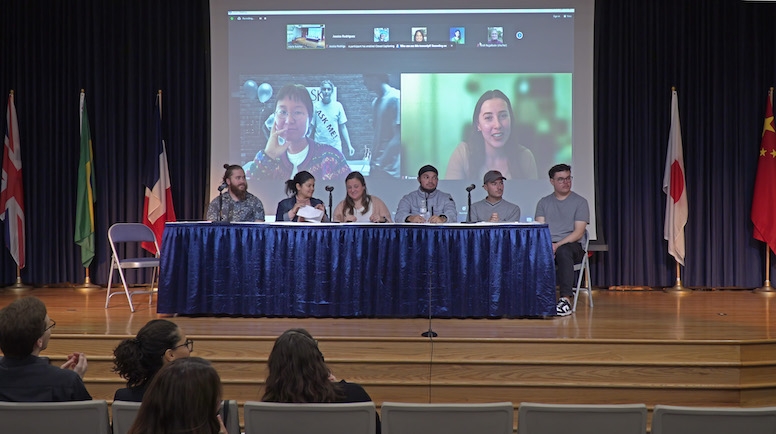Multilingual Symposium Offers Students Valuable Professional Experience in Their Language of Study

At the Middlebury Institute, you don’t have to wait until you graduate to practice advanced language skills in a professional setting.
Each year the Institute’s Language Studies faculty sponsors a themed student symposium that simulates an international conference. This year, about a hundred students presented in their language of study on topics related to peace and conflict transformation. Translation and interpretation students performed simultaneous interpretation of the proceedings in multiple languages. This interdisciplinary learning approach unique to the Institute is known as the “Monterey Model.”
Dialogue across Languages and Disciplines
“That was the first time I’ve presented in another language on a stage in front of people,” said second-year International Education Management/MPA student Ellie Hoffman, whose presentation in French focused on the value of human rights education for developing engaged citizens. “It was a really helpful experience, and also motivated me to make the connections between my area of study, which is education, and human rights and peace.”
The symposium was staged on consecutive Wednesdays in the Irvine Auditorium and featured panels of students on topics including gender apartheid in Afghanistan, the ripple effects of the conflict in Sudan, and the impact of instability in Lebanon on the marine environment. Languages spoken by panelists and/or their interpreters included Arabic, English, French, Spanish, and Japanese.
“We selected the theme of peace and conflict transformation last semester while we were witnessing the war in Ukraine,” said Professor Marie Butcher, head of the English for Academic and Professional Purposes program and the faculty sponsor of this year’s symposium. “And then just two weeks before the event, the heartbreaking conflict in the Middle East erupted. We must acknowledge that our work is incredibly challenging, while also emphasizing how important it is to engage in constructive dialogue about conflict transformation at this time.”
Student participant Giovana Rodrigues Manfrin MANPTS ’24 said she appreciated how simultaneous interpretation made the conversations immediately accessible and authentic.
“The symposium highlighted the importance of dialogue, of coming together and challenging paradigms and bringing forward new ideas in a way that invites people from all cultures and backgrounds to engage,” said Manfrin.
My time at MIIS helped me realize the importance of being closely connected to the people affected by conflict—to listen more and speak less.
Honoring Human Rights Activism
During the event, Nonproliferation and Terrorism Studies alum Valentina Bianco Hormaechea ’20 was honored with the Jan Knippers Black Fund for Human Rights Protection’s annual alumni award. The award is named for the late Institute faculty member Jan Knippers Black, whose work on human rights took her around the world.
Born in Argentina, Hormaechea interned with the United Nations while a student at the Institute and was hired after graduation as an associate external relations and reporting officer at UNHCR, the UN Refugee Agency. Hormaechea’s current posting is in Baghdad, Iraq.
“My time at MIIS helped me realize the importance of being closely connected to the people affected by conflict—to listen more and speak less,” said Hormaechea. “I firmly believe that we, the fortunate ones who actually make it into high-level education at a prestigious institution, have a responsibility to stand by those who do not have the same luck. Jan’s life reminds us that sustained commitment, speaking up, and getting involved really matter.”
The Jan Knippers Black Fund builds awareness and engagement around human rights protection among Institute students in three important ways: funding the Amnesty International USA fellowship for a current student to intern with that organization; bringing distinguished activists and practitioners to campus for an annual human rights speaker series; and annually presenting an award to a Middlebury Institute graduate who has achieved distinction as a human rights activist.
Coming Together for Peace
Following the close of the symposium on November 1, the Mexican “Day of the Dead,” many participants gathered again at the peace pole in the Institute’s community garden for a peace vigil. They honored the lives of those lost in recent conflicts, as well as loved ones who had passed away.
“In many ways, this symposium summed up what makes the Institute so unique by offering students the opportunity to simulate a high-level multilingual international forum on the most critical issues of our times,” said Butcher.
Butcher and a group of students are now working on the Peace, Poetry, & Policy project, aims to provide context for connections between poetry, peacebuilding, and policymaking—through historical and contemporary examples. They are seeking submissions by January 1 (priority deadline) for a multilingual anthology of poems, which will be followed by practices for integrating poetry into the classroom and/or other spaces for restorative justice and healing. The first phase of this project has been supported by the KWD Collaborative in Conflict Transformation. The greater Middlebury community - from emerging to established poets - is invited to submit poems on the themes of peace, conflict transformation, restorative justice and healing in any language.
This project derives its inspiration from the monthly multilingual poetry gatherings, initiated by Professor Rana Issa, Professor of Arabic at MIIS. The International Cultural Gatherings club and Language Studies continue to sponsor monthly poetry gatherings on the last Sunday of the month from 3-5pm, held at the East Village Café in downtown Monterey. Learn more.
